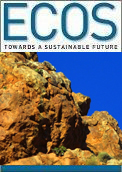
|
Published: 6 February 2012
Treaty to enforce fair sharing of natural genetic resources
Australia has signed the Nagoya Protocol, an international treaty that will establish a legally binding framework for the use of genetic resources in a rapidly expanding global industry.
The Director of National Parks, Peter Cochrane, said the protocol – a supplementary agreement to the UN’s Convention on Biological Diversity – would help ensure researchers and companies around the world delivered benefits to Australia from their use of our genetic resources.
‘Research and development from natural genetic resources is a multi-billion dollar global industry,’ said Mr Cochrane.
‘Companies are increasingly looking to the world’s biodiversity as a source of new medicines, cosmetics and industrial products – in the past decade more than 70 per cent of new cancer drugs and more than one-third of drugs for other human diseases have been derived from natural resources.
‘In the absence of an international legal framework, the natural resources that researchers find in one country may be turned into hugely profitable new products in another – with no return to the source country.
‘As one of a handful of mega-diverse countries, with more than 80 per cent of our species found nowhere else, Australia’s biodiversity is of enormous commercial interest.
‘While we already have a domestic access and benefit sharing system to manage the collection of our genetic resources, the Nagoya Protocol will ensure that once our resources leave our shores the user country will check that our regulations have been obeyed, and support the delivery of benefits back to us.’
Mr Cochrane said the protocol will also help ensure compliance with environmental laws and the value of Indigenous knowledge in the wider Australian-Pacific region.
‘ The Nagoya Protocol will [give] certainty to business investment and [help] ensure that research is carried out in an environmentally friendly and sustainable way.
‘The protocol also recognises and respects the value of traditional knowledge and genetic resources held by Indigenous people, making sure they also benefit from any use of this knowledge.
‘Many developing countries in our region are worried about the exploitation of their genetic resources. As Australia already has a best-practice domestic regime in place, we are now planning to support our neighbours develop their own access and benefit sharing regimes so that they can take advantage of the protocol’s protection, beginning with a series of South Pacific workshops over the coming year led by Australian experts.’
The Nagoya Protocol will come into effect after 50 countries have ratified it – the next step in the process.
Source: Australian Government media release




